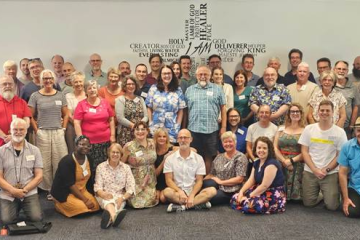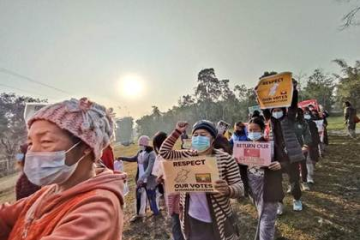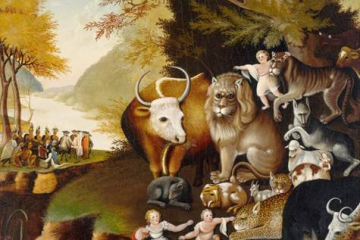Don’t let go – Gen 32:22-31 and Psalm 17:1-7, 15
I re-read this week a Tim Winton short story from his 2016 book, The Boy Behind the Curtin. It’s the autobiographical short story about growing up in the Churches of Christ in the 60s and 70’s, and about his journey of faith since, and it’s titled – Twice on Sundays – though, as he says in the story, “the twice-on-Sundays label probably sold us short.”
He describes the Sundays of his childhood – not as a day of rest – but as a day of wrestling with the world, the devil, and your own energy reserves. At 8:30am, in their Sunday best, they rounded up the neighbourhood kids, packed them two by two into the back of his father’s station wagon and took them to Sunday School. After, his father drove them home, collected pensioners who were without transport and was back for the 11am service. After that they ate their Sunday roast and spent the afternoon visiting unsaved family members. Sunday tea, he writes:
…was little more than a ringside squirt and a flick of the trainer’s towel because, knackered though we were, Sunday had plenty of fight left in it; there were more rounds to contend with… We had the evening gospel service to stagger through yet – always a strenuous affiair. Then there was Fellowship Tea, ostensibly a social occasion but in truth another opportunity to ‘witness’ to newcomers and bring them to the brink of salvation. Which is nobody’s idea of a casual warm-down. …We were a long way short of putting Sunday to the canvas…In order to finish the job, fight the fight and run the race, you had to give your all….
When I was a kid the Day of Rest required grit; it was a marathon, a test of character. Looking back I wonder if we only went to school on Monday for a breather.”
But although Winton uses the analogy of a wrestling match for surviving Sundays, there is a sense he is applying it to his life-long struggle with church, with its sometimes breathtaking and sometimes very limited expression of grace.
But in this struggle the blessings he found were ‘story’ and ‘language’ and ‘the power of metaphor’ to reveal – if we wrestle long and hard enough with it – truth and behind that truth, grace. He writes:
My favourite stories were endlessly repeated and learned by heart. Behind them all – from Jacob pulling a hamstring in his struggle with the angel to Elijah fed by ravens, or the Nazarene overcome by crowds at the lakeside – lay two great mysteries: the unfathomable presence of the divine, and the perennial enigma of human behaviour.
Our Old Testament reading this morning – this story of Jacob pulling a hamstring – is a story about confronting these two great mysteries.
For here Jacob meets – comes face to face with –the unfathomable presence of the divine. It is an encounter that takes place when he is at his lowest – he has fled his father-in-law ’s family and now fears the reception he will have from his own (who he fled from previously). It is an encounter that takes place when he is alone. It is an encounter that takes place in the dark. And at his lowest, alone and in the dark he wrestles a person who the text refuses to identify. This person is not only unknown but unnamed – perhaps unnameable. (We are reminded of the angel of the Lord’s response to Monoah, the father of Samson, “Why do you ask my name? It is too wonderful.”) And yet after wrestling for hours with his assailant, continuing to wrestle though injured, continuing to wrestle until daybreak (the moment of revelation), Jacob comes to know who he is wrestling with and demands a blessing and calls the place ‘Peniel’, meaning, “I have seen God face to face…”
Secondly, Jacob, not only meets God and wrestles with God, but lives to tell the tale…. “and yet my life is preserved.” This man who has connived and schemed for blessings all his life, who has run when danger threatened, stands his ground for once and wrestles with God and refuses to let go of God – refuses to let go of God – his new name, Israel, means “to persevere’, to not let go – and in this this way, Jacob/Israel wins a blessing fair and square.
Some of you will know the story of German theologian, Jürgen Moltmann, who was a German prisoner of war at the end of World War II and his encounter with God. In a lecture he entitled ‘wrestling with God’ Moltmann says:
When I read again and again Jesus’ death cry, ”My God why have you forsaken me?’ I began to understand with certainty, ‘This is the one who understands you… This is the divine brother in distress who takes the prisoners with him on his way to resurrection and freedom. I began to summon up the courage to live again seized by a great hope… This early fellowship with Jesus, the brother in suffering and the redeemer for guilt, has never left me since and I am sure that then and there in the dark pit of my soul, God found me.
Throughout the lecture Moltmann refers to Genesis 32, for as he says that, as a prisoner, it was in the story of Jacob’s struggle that he found ‘his own human story’:
In those nights [in the camp] one was alone like Jacob and fought with principalities and powers that seemed dark and very dangerous. It was only afterwards and later that it became clear with whom one had been wrestling. We wrestled with God in order to survive in the abysses of senselessness and guilt and we emerged from those years “limping” indeed, but blessed.
What Jacob and Jürgen Moltmann discover is that they must wrestle with God. They must wrestle although injured in the fight. They must wrestle and not let go. And yet in this encounter they also discover that God comes face to face with them in the darkness of their lives. That God comes to us in the darkness of our lives. That God wrestles with us. That God wrestles with us although God is injured in the fight. That God wrestles with us and will not let go. In Moltmann’s words, “I was searching for God, but I sensed already that God was drawing me. That I should not be seeking God if God has not already found me.”
God comes to us. God will not let us go. Our greatest blessing is a God who will not let us go because God loves us.
I was reminded of that short story of Tim Winton’s, of his recollections of what mission looked like, of what church looked like, in the 60’s and 70’s (recollections some of us share) as we gathered last Saturday, as a church, to think about what mission looks like now, and what it could look like, what church looks like now, and what church could look like.
Along the lines of the famous Frederick Buechner quote we asked questions about the needs of our local community – what is the deep hunger of this community? And we asked questions about ourselves – what is the nature of our gladness? Where is the place God is calling us to – where this deep gladness and this deep hunger meet?
And we asked questions about church. Is the way we come for worship, to meet our God face to face, meeting the needs of our whole community? And how do we meet the needs of a very diverse, disparate even, community?
And in that discussion, I heard a great deal of generosity, of people saying that other’s needs should come before their own. And I heard a great deal of passion, of concern and longing that our children and their children will also find faith communities – worship spaces – expressions of mission where God meets them, and they meet God. And I heard a great deal of wisdom. One young woman (unnamed but not unrecognisable!) saying that these questions are simply the questions we must keep asking; that we may not find the answers, that we might never find the answers, but these are the questions we must keep asking.
Just after the Saturday session I went home and said to my son, Zach, what do you think we should do to make faith real for the younger generation… to connect them to faith. And Zach said immediately, a bit flippantly, “I think Jesus would have to come back…so we can see him face to face.”
Thinking about that comment and that morning and this story, I’ve realised I can’t do that for the next generation – or for any other generation – or for anyone else! We all have to wrestle with God ourselves…bringing our lives, our questions, our darkness and finding in that struggle God’s presence and God’s love.
But what I can do – what we all can do – for the next generation or for others – is to show them – to live them – lives of faithful wrestling, of keeping on asking questions, of praying without ceasing, of stepping out in faith, of being generous and sacrificial, of, from to time, having our hearts broken, but holding onto God, holding onto God, holding onto God, until our name too – Christian – means the ones who persevere, who hold onto God…
Spoiler alert! That is what Christian means. It means that we are following Christ, we are continuing to follow Christ because in following Christ we have found that the name of God, the face of God, the grace and help of God, is Jesus.
Our greatest blessing is a God who will not let us go, and we see this God in Jesus.


